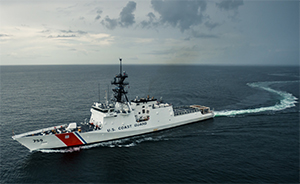President Trump surprised and dismayed supporters of the U.S. Coast Guard in late February by proposing a $1.3 billion cut in the service’s funding while recommending a 10 percent increase in defense spending.
Trump’s pledge to boost the Pentagon’s budget by $54 billion did not include the Coast Guard, which faces a sharp reduction from its $10 billion allocation for fiscal 2017. Nearly half of the savings, or about $500 million, would come from canceling a ninth national security cutter that would be built by Ingalls Shipbuilding in Pascagoula, Miss.
Opponents of Trump’s proposal, including many Republicans, say it’s foolish for the president to build a wall to keep out illegal immigrants from Mexico while decreasing coastal patrols that block unauthorized entry into the country. They also said reducing the Coast Guard’s presence could lead to an increase in terrorism.
The most vociferous opposition to the Trump funding recommendation has come from Rep. Duncan Hunter, R-Calif., chairman of the House Subcommittee on Coast Guard and Maritime Transportation. “It’s nonsensical to pursue a policy of rebuilding the armed forces while proposing large reductions to the U.S. Coast Guard budget,” Hunter said in a March 2 letter to the president.
In a follow-up letter, Hunter suggested that the White House shift the Coast Guard from the Department of Homeland Security to the Defense Department.
“Over time, the Coast Guard’s mission importance has not been properly recognized or advocated for — as demonstrated by years of underfunded budget requests, and perhaps most clearly by this year’s grossly inadequate proposed Office of Management and Budget (OMB) funding guidance,” Hunter wrote. “The Coast Guard is a military force. It deserves to be housed in a department that recognizes the importance of its mission and has the capabilities to properly advocate for greatly needed resources.”
After all of the blowback, OMB Director Mick Mulvaney told reporters on March 15 that the Department of Homeland Security would have the discretion to allocate its budget, with a 6 percent increase, as it saw fit. That statement offered a way to preserve the Coast Guard’s funding, but Hunter and other elected officials who oppose any reduction in support said a reprieve was not certain, and they kept up their pressure on the White House.
Meanwhile, Coast Guard Commandant Adm. Paul Zukunft called for increased funding in his annual State of the Coast Guard address at the National Press Club on March 16.
“We have always prided ourselves as a service that punches above our weight class,” he said. “Yet, as our nation’s fifth armed service, somehow we find ourselves budgeted at the bottom. Using a boxing metaphor, we are funded in a flyweight class. After 226 years of service, the time is long overdue to up our weight class to at least the middleweight division.”
In his first letter, Hunter called for increased Coast Guard spending as Russia under Vladimir Putin continues a military buildup in the Arctic by reopening air bases and deploying troops supported by nearly 40 icebreakers. The Coast Guard fleet has just two heavy icebreakers that were commissioned in the 1970s — one of which has been out of service since 2010.
Hunter’s letter to Trump said the proposed Coast Guard cut “egregiously conflicts with your stated goals to strengthen national security. … Such a drastic reduction in Coast Guard funding would not only diminish the Coast Guard’s standing and mission next to its service counterparts, it would severely undermine U.S. national security.”
Hunter continued, “You enumerated the threat posed by foreign criminals and illegal drugs entering the U.S. … The Coast Guard is the only military service with an extensive domestic counter-narcotics mission with direct alignment with border security and law enforcement. Worth noting is that the Coast Guard interdicts more cocaine at sea than what is interdicted at ports of entry and among all other elements of domestic law enforcement combined.”
Hunter said eliminating the ninth national security cutter currently under construction would wipe out “hundreds of high-paying American jobs” and waste “hundreds of millions of taxpayer dollars.”
Senate Appropriations Committee Chairman Thad Cochran, who represents Ingalls’ home state of Mississippi, said “any proposals to reduce support for the Coast Guard will receive careful scrutiny in Congress.”

